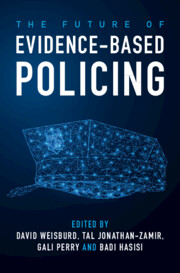Book contents
- The Future of Evidence-Based Policing
- The Future of Evidence-Based Policing
- Copyright page
- Contents
- Figures
- Tables
- Contributors
- Editors
- 1 The Future of Evidence-Based Policing
- Part I Taking Stock of Evidence-Based Policing
- Part II The Evidence for Evidence-Based Policing
- Part III Innovations in Tools of Evaluation and Assessment
- Part IV Challenges to the Implementation of Evidence-Based Policing
- Part V The Practitioner’s Perspective
- 14 The Role of the “Super Evidence Cop” in Evidence-Based Policing
- 15 Looking Back on the Challenges to Evidence-Based Policing
- 16 Support for Evidence-Based Policing at the National Level
- 17 Conclusions
- Index
- References
16 - Support for Evidence-Based Policing at the National Level
More Help Than Harm?
from Part V - The Practitioner’s Perspective
Published online by Cambridge University Press: 01 June 2023
- The Future of Evidence-Based Policing
- The Future of Evidence-Based Policing
- Copyright page
- Contents
- Figures
- Tables
- Contributors
- Editors
- 1 The Future of Evidence-Based Policing
- Part I Taking Stock of Evidence-Based Policing
- Part II The Evidence for Evidence-Based Policing
- Part III Innovations in Tools of Evaluation and Assessment
- Part IV Challenges to the Implementation of Evidence-Based Policing
- Part V The Practitioner’s Perspective
- 14 The Role of the “Super Evidence Cop” in Evidence-Based Policing
- 15 Looking Back on the Challenges to Evidence-Based Policing
- 16 Support for Evidence-Based Policing at the National Level
- 17 Conclusions
- Index
- References
Summary
Since the late 1990s, many scholars, policymakers and others have encouraged policing to adopt evidence-based approaches much in the way the medical profession had adopted science-based evidence years before. Using Sherman’s “national forces” notion, we review the role that national organizations and entities have played in encouraging or discouraging the adoption of evidence-based policing in the United States’ highly decentralized policing context of 18,000 independent agencies. While there have been key organizations and peak periods of support of evidence-based policing, there are still many barriers to the adoption of this idea, including misunderstanding and lack of clarity about what evidence-based policing is; political concerns and/or interference, and generally a lack of will; the diverse policing landscape in the United States; and lack of a clear application model for basic policing decisions. In response, we propose the development of a Professional Policing Doctrine that “infuses” Sherman’s concepts of the Triple T strategy and the Cambridge Assignment Management System with concepts promoted by the President’s Task Force on 21st Century Policing and a Hippocratic Oath for policing. Additional recommendations are provided for supporting the integration of evidence-based policing and for confronting some of the challenges standing in the way of this goal.
Keywords
- Type
- Chapter
- Information
- The Future of Evidence-Based Policing , pp. 315 - 335Publisher: Cambridge University PressPrint publication year: 2023

